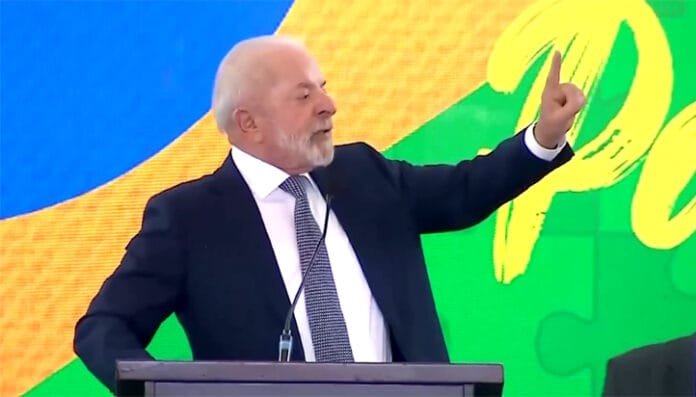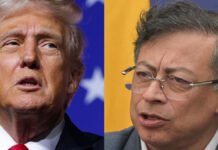In a sharp rebuke to the United States, Brazilian President Luiz Inácio Lula da Silva has firmly rejected President Donald Trump’s proposal for bilateral discussions over tariffs. The tensions escalated after Trump threatened a 50% tariff on Brazilian goods, triggering a global economic and diplomatic stir. In an assertive and calculated response, Lula has declared his intent to escalate the matter on multilateral platforms like the World Trade Organization (WTO) and the BRICS alliance, emphasizing solidarity over submission.
Lula Refuses Trump’s Call: A Symbolic Shift in Global Trade Alliances
In an unusually pointed statement, Lula declined to accept a direct phone call from President Trump, signaling a pivot away from bilateral appeasement and toward collective resistance through international partnerships. The Brazilian leader stated:
“We will not be dictated to. Brazil will use all institutional mechanisms available to defend our economic sovereignty.”
This refusal marks more than just a diplomatic cold shoulder; it underscores a strategic maneuver aimed at leveraging BRICS unity—with India, Russia, China, and South Africa—to build a united front against aggressive U.S. trade practices.
US Tariff Threat: Trump Declares 50% Duties on Brazilian Imports
President Trump’s announcement of a 50% tariff on Brazilian exports has sent shockwaves across international markets. The protectionist move, justified by the Trump administration as necessary for “preserving American jobs and countering currency manipulation,” specifically targets Brazilian steel, aluminum, and agricultural products.
Such steep tariffs could significantly cripple Brazil’s export-driven sectors, which rely heavily on trade with the U.S. According to Brazil’s Ministry of Economy, over $30 billion worth of goods were exported to the United States in the last fiscal year alone, with steel, soy, and beef leading the list.
Lula’s Counterattack: Multilateral Diplomacy Over Bilateral Submission
President Lula’s swift countermeasure was not only rhetorical but also institutional. Brazil is preparing to lodge a formal complaint with the World Trade Organization, citing violation of fair trade principles under GATT (General Agreement on Tariffs and Trade).
Moreover, Lula emphasized that Brazil would seek solidarity and strategic alignment with BRICS partners, notably India’s Prime Minister Narendra Modi, to formulate a coordinated response. Lula stated:
“Instead of phoning President Trump, I will call Prime Minister Modi. Together, the BRICS countries will discuss the appropriate response to this economic aggression.”
Why Lula’s BRICS Strategy is a Masterstroke
By choosing to bypass direct dialogue with Trump in favor of collective diplomacy with BRICS, Lula is reinforcing a crucial global message: the era of unipolar economic dominance is over. BRICS, comprising some of the world’s largest emerging economies, represents over 40% of the global population and nearly a quarter of global GDP.
This move not only enhances Brazil’s bargaining power but also raises the geopolitical cost for the United States to act unilaterally. It also signals a shift toward multipolar economic cooperation, where countries resist coercive economic tactics through united blocs.
India’s Role: A Critical Pillar in Brazil’s Strategic Realignment
India stands to play a central role in this unfolding drama. As a founding member of BRICS and an economic giant in its own right, India has historically maintained cordial ties with both the United States and Brazil. Lula’s decision to reach out directly to PM Modi is a calculated diplomatic move, aimed at consolidating South-South cooperation in the face of Western economic aggression.
India’s response, though yet to be made public, is expected to focus on maintaining strategic autonomy while also supporting Brazil’s position within BRICS mechanisms. If Modi throws his weight behind Lula, it could tip the balance of global opinion further against the U.S. move.
Economic Fallout: What Brazil Stands to Lose—And Gain
In the immediate term, Brazil’s agricultural and mining sectors face significant disruptions. The U.S. market accounts for nearly 15% of Brazil’s beef exports and 12% of its aluminum trade. A 50% tariff will raise end-consumer prices in the U.S., possibly causing a backlash among American importers and manufacturers.
However, Lula’s pivot toward BRICS and WTO channels opens new opportunities for diversification. Brazil could redirect its exports toward Asian and African markets, especially India and China, both of which are ramping up infrastructure and food security programs.
Moreover, Brazil’s strong stance could strengthen its global image as a leader in fair trade and multilateralism, attracting favorable trade terms from other emerging economies.
Global Implications: Is This the Dawn of the Post-America Trade Order?
Lula’s defiance and strategic outreach are not just a national reaction—they could catalyze a global shift in how countries deal with aggressive economic nationalism. The world is closely watching how this confrontation unfolds, especially in the context of ongoing trade wars between the U.S. and China, and tensions with the European Union.
If successful, Brazil’s approach could become a template for resisting economic coercion, empowering smaller and medium economies to stand up to superpowers through coalitions like BRICS, ASEAN, and the African Union.
Expert Reactions: Analysts Applaud Lula’s Strategic Discipline
Global trade experts and political analysts have praised Lula’s move as both bold and pragmatic. According to Professor Alejandro Duran of the University of São Paulo:
“What Lula has done is redefine the rules of engagement. He’s not just protecting Brazil’s economy—he’s challenging the entire structure of U.S.-centric trade diplomacy.”
Similarly, Dr. Ananya Bhattacharya, an international trade specialist based in New Delhi, notes:
“By reaching out to India and BRICS, Lula is rewriting the narrative. This could very well be the beginning of a more balanced world trade order.”
Conclusion: Brazil Charts a New Course in Global Trade Politics
This unfolding tariff war between Brazil and the United States represents more than just economic friction—it’s a test of global sovereignty, diplomatic acumen, and multilateral strength. President Lula’s refusal to engage directly with President Trump is not an act of defiance alone—it’s a declaration of a new diplomatic philosophy rooted in unity, respect, and strategic cooperation.
As the situation develops, all eyes will be on Prime Minister Modi’s response, the BRICS summit outcomes, and the WTO proceedings. What is certain, however, is that Brazil is no longer willing to play second fiddle on the global economic stage—and its bold move could set a precedent that reshapes the future of international trade.
















